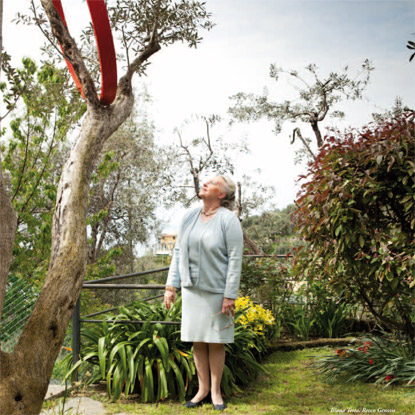Signora Testa liebt Lachen und Zufälle oder sagen wir: Sie ergreift gern Dinge, die auf ihrem Weg liegen: Dreissig Jahre lang flog sie als Stewardess der Alitalia um die Welt, und wenn die Crew einen Ruhetag in einer Metropole hatte, nutzte sie den Abend für ein Konzert, ein Ballett, die Oper. So sah sie Rudolf Nurejew in New York tanzen, das Ballett Romeo und Julia tatsächlich in Bangkok und Cosí fan tutte in Boston – auf englisch. Eines Tages fiel ihr Blick in einem Laden in Philadelphia auf 19 LPs: Der Ring mit Martha Mödl als Brünnhilde. Beim Zoll sagte sie „Wagner“, und wunderte sich, dass der Beamte sie mit dem Riesenpaket durchwinkte. Die Figur des Wotan verbindet Iliana Testa mit dem geliebten Vater. Der Armee-Offizier hatte die Tochter mit seiner Leidenschaft für klassische Musik angesteckt. Sie hat ihn als korrekt, sensibel, immer etwas distanziert erfahren. Und später erlebt, wie der Offizier und Gentleman mit der Uniform auch einen Teil seines Glanzes verlor. Der Abschied Wotans, auch er kann sich nicht aus den Systemen befreien, lässt sie weinen, selbst wenn der Göttervater nur im Fernsehen „Leb wohl, leb wohl“ singt. Im Festspielhaus haben sie und eine unbekannte Nachbarin einander dabei stumm die Taschentücher gereicht. Zum Grünen Hügel fährt sie wie nach Lourdes, sagt Iliana Testa lachend. Auf der Pilgerreise schaut sie die kleinen Städte entlang der Route an und erwartet die Inszenierungen mit vergnügtem Gleichmut: „Manchmal müssen wir halt für die Musik leiden und für die wunderbaren Stimmen“. Sie erinnert sich an einen nackten Meistersänger und an einen dicken Parsifal in Kinderkleidern, was die mit dem Schönheitssinn ihres Landes ausgestattete Italienerin zu amüsierten Bemerkungen animiert. Je näher sie Bayreuth kommt, desto mehr steigt ihre Stimmung: „Mit jedem Mal fühle ich mich jünger“.
Pilgrimages Signora Testa loves to laugh and she loves coincidences. Or let’s say: she loves to take things as they come. For thirty years she flew all around the world as a stewardess with Alitalia. When the crew had a day off in some metropolis, she spent her evenings going to a concert, seeing a ballet, attending the opera. She has seen Rudolf Nureyev dance in New York. In Bangkok, of all places, she saw Romeo and Juliet, the ballet. She has seen Così fan tutte in Boston – in English. One day in Philadelphia, her eyes set on a big box with 19 LPs. The Ring, with Martha Mödl as Brünnhilde! At the border she said “Wagner”, and wondered that the customs officer just waved her and her outsized package right through. Iliana likens the figure of Wotan to her father. It was the Army officer who infected his daughter with his love for classical music. She had always experienced him as correct, sensitive, and a little aloof. Later she experienced how, as the uniform went, so did some of the luster of the gentleman and ex-officer. Wotan’s Farewell, the farewell of a man who can’t break out of the set structures, makes her cry – even if she hears it on TV and as little as Wotan’s “leb wohl, leb wohl”. During that scene at the Bayreuth Festival, she and her anonymous seat neighbor silently offered each other handkerchiefs. She approaches the Green Hill like Lourdes, Iliana Testa says, laughing. On her pilgrimage to Bayreuth, she visits all the little towns along the way and anticipates the productions with merry equanimity: “Sometimes we have to suffer for the music, and those wonderful voices” she says, and cites a naked Stolzing and an overweight Parsifal in children’s clothing, which led to bemused comments from our Signora Testa, fully endowed with the aesthetic sense her country is famous for. The closer she gets to Bayreuth, the more her mood improves. “And I feel younger every year.”
La Signora Testa aime le rire et les hasard, ou, osons le mot : elle saisit ce qui se trouve sur son chemin : pendant trente ans, elle a parcouru la planète dans son uniforme d’hôtesse de l’air sur Alitalia, et lorsque l’équipage avait un jour de repos dans quelque métropole, elle se précipitait au concert ou à l’opéra. C’est ainsi qu’elle a pu voir danser Rudolf Nureev à New York, le ballet de Roméo et Juliette à Bangkok, mais oui, et Così fan tutte à Boston — en anglais. Un jour, dans un magasin de disques de Philadephie, son regard tomba sur un coffret de 19 disques : La Tétralogie, avec Martha Mödl en Brünnhilde. A la douane, elle a juste dit « Wagner », et s’étonna de ce que le préposé la laissât passer avec son énorme paquet. Pour Iliana Testa, le personnage de Wotan, c’est un peu son père, qu’elle adorait. Officier de l’armée, il avait inculqué la passion de la musique classique à sa fille. Elle avait le souvenir de quelqu’un de correct, sensible, toujours un peu distant. Par la suite, elle devait être témoin de la perte de prestige de l’officier et gentleman lorsqu’il déposa l’uniforme. Le départ de Wotan, qui ne peut, lui non plus, se départir d’un système, la fait fondre en larmes, même quand elle ne voit chanter le père des dieux que sur un téléviseur : « adieu, adieu ». Au Festspielhaus, avec une voisine de fauteuil, elles se sont échangé mutuellement des mouchoirs, sans mot dire. Elle se rend sur la Colline verte comme à Lourdes, dit-elle en riant. Sur la route du pèlerinage, elle s’arrête flâner dans de petites villes et attend la mise en scène avec une humeur égale, mais brûlante de joie : « parfois, il faut souffrir pour la musique et pour ces voix merveilleuses ». Elle se rappelle les maîtres-chanteurs, dans leur plus simple appareil, ou bien l’embonpoint de ce Parsifal habillé en enfant, ce qui, chez une italienne équipée de tout le goût de la beauté dont est capable la péninsule, ne manque pas de susciter des commentaires. Plus Bayreuth approche, plus fort monte son moral : « à chaque fois, ça me rajeunit ».

